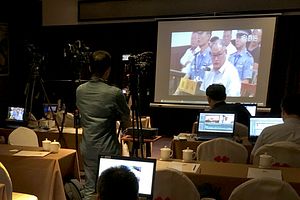The gulf between legal systems across the Taiwan Strait is far wider than a hundred miles. Last month, Lee Ming-che — a Taiwanese citizen and human-rights activist — pleaded guilty to subversion charges in China for peacefully expressing political opinions. Today he remains in custody awaiting a decision on his punishment. Lee’s case has heightened already strained cross-strait relations. It has also laid bare the increasing divergence between China and Taiwan with respect to protecting human rights.
In three decades, Taiwan has transformed from martial law to a flourishing democracy embracing international human rights norms. China simultaneously has not only remained under strict one-party rule but also seen a shrinking space for civil society and a crackdown on lawyers who advocate for their clients’ rights. In Lee’s case, he was denied representation of his choosing. His court-appointed lawyer spent less than five minutes questioning his client and failed to present any favorable evidence. Lee’s defense consisted of a well-rehearsed statement of how he had been misled by Taiwan’s media and had only learned the truth about China from watching television programs while held in criminal detention.
Admittedly, a more zealous defense would have been futile: the conviction rate in China is over 99 percent even in non-politically-charged cases. And, given Beijing’s sweeping view of what constitutes subverting state power, it encompasses activities within the fundamental right to freely seek, receive, and impart information about human rights. Lee’s web-broadcasted confession was a carefully orchestrated spectacle, not a meaningful legal proceeding.
The farce of a trial has implications domestically in China, across the Taiwan Strait, and internationally. First, within China, Lee’s case underscores the intolerance for views that are not in lockstep with the Chinese Communist Party. Criminalization of dissent is, of course, not new: Lee joins scores of PRC citizens whose exercise of fundamental human rights has been construed as criminal behavior, including the late Nobel Laureate Liu Xiaobo who was similarly convicted of subversion. Liu was convicted eight years ago, and heightened repression is particularly common in the lead up to the five-year party congress that will be held later this month. But Lee’s case is further indication of ratcheted-up repression. The scale and ferocity of the ongoing crackdown forebodes that Xi Jinping will continue to squelch dissent as he embarks on his second five-year term as PRC president and party general secretary. Criminalizing political debate is integral to the party’s long-term strategy of maintaining its lock on power.
Second, the Chinese idiom of “killing the chicken to scare the monkey” (杀鸡儆猴) indicates punishing an individual as an example to others. Here, China has struck down Lee with a crime that carries up to a life sentence in order to send a warning to other Taiwanese who travel across the strait.
For the hundreds of thousands of Taiwanese citizens residing in China at any time, Lee’s case is a cautionary tale regarding strict avoidance of political expression. If any of those citizens are detained, Lee’s case demonstrates that China, unlike Taiwan, is refusing to honor the 2009 cross-strait agreement on mutual judicial assistance. The agreement requires one side to give prompt notification when detaining persons from the other side and to provide facilitation for visits by family members — neither of which has been done during Lee’s months of incommunicado detention. Lee’s wife was allowed to view the trial, but China has denied all requests to actually visit her husband.
For Taiwanese who are not physically present in China but maintain contacts there, Lee’s case is a warning of the perils of visiting if their communications have addressed democracy, human rights, or other topics deemed threatening by Beijing. Most recently, the PRC government warned of negative consequences for engaging in “separatism” following pro-independence remarks by new Taiwanese Premier Lai Ching-te. The crime of separatism can carry a life sentence under PRC law.
Third, Lee’s case highlights the contrast between Taiwan’s and China’s international engagement with human rights norms. In 2009, then Taiwan President Ma Ying-jeou signed the International Covenant on Civil and Political Rights (ICCPR). Taiwan could not actually become a party to the covenant due to its unusual international status, but the legislature incorporated the contents into domestic law. Taiwan has since engaged in periodic review procedures by international experts that mimic those state parties undergo.
Meanwhile, China’s relentless criminalization of peaceful political expression evinces that its signature on the ICCPR is meaningless. It has been nineteen years since China signed the ICCPR, which provides that “[e]veryone shall have the right to freedom of expression.” As a signatory that has expressed its intent to ratify the covenant, China has an obligation to refrain in good faith from acts that would defeat its purpose. Yet China has repeatedly done just that. It is high time for China either to shift course and ratify the ICCPR or to remove the veneer of compliance and declare its intention not to be bound by this foundational human rights document. At least then the PRC government would be forthright to the world in its repudiation of civil and political rights instead of tacitly subverting international human rights norms in the process of accusing others of subversion.
Margaret K. Lewis is a Professor of Law at Seton Hall University and a Fulbright Senior Scholar at National Taiwan University College of Law. She tweets at @MargaretKLewis.

































